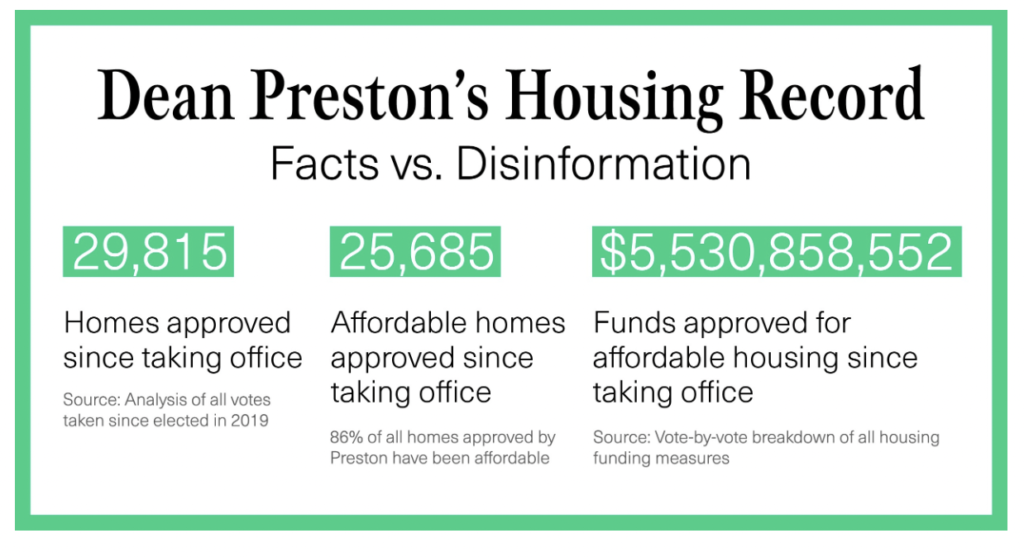Back in 2021, when Heather Knight was still at the Chronicle, the Yimbys put out something they called a “study” of the housing record of Sup. Dean Preston. Knight took it all at face value and put it out as news.
The message, which the Yimbys and other foes of Preston (and foes of David Campos, and I’m sure we will see this with other supes, too) are putting out: These politicians, for some selfish, nefarious reason, don’t want to see enough housing constructed to bring down prices for the rest of us.
That, a new study shows, was completely factually inaccurate.
The information matters not just because Preston is now running for re-election but because the entire news media debate over housing continues to be dominated by the Yimby narrative, and nobody at the Chron seems willing to challenge it.

For starters: Preston is only one of a huge number of progressives who have studied and worked on housing issues who argue that building market-rate development isn’t going to solve the housing crisis—and in some cases, could make the situation worse.
This is an actual political debate, over economic data and policy. Everyone on all sides (except for some landlords) wants more housing affordability, and most of us would love to see prices fall across the board.
The Yimbys have turned it into personal attacks, which I have also faced, which typically go like this: You already own a house, so you care nothing about the rest of us who don’t, and you don’t want to see more housing constructed because it will bring down your property values.
Again, in many cases, factually untrue: Upzoning Bernal Heights, where I live, makes land and housing more valuable, not less. And while it may be hard for the Yimbys to comprehend, there are a whole lot of people on the left in San Francisco, and elsewhere, who are not primarily driven in their political beliefs by their own economic self-interest.
But back to Preston.
The new study, done by three housing advocates, Harlo Pippenger, Hope Willilams, and Misha Steier, looks at the actual votes Preston (and for the most part, the other progressives on the board) have taken on housing issues in the past three years:
We counted “homes approved” as votes that add units of housing where they did not exist previously. This includes votes to finance construction of housing units, acquire new sites for housing, authorize the creation of new affordable housing, acquire private hotels for supportive housing, and others. If the same units were approved in multiple votes by Preston, we counted the units only once in our “homes approved” or “affordable homes approved” totals.
We counted “funds approved” as votes that directed funds to affordable housing, whether or not the funding created new housing units. This includes approval of state and federal grants to support housing development, funds for operating agreements for permanent supportive housing, funds for pandemic-related rent relief, and other housing investments. We note that most market rate housing projects, while they come before the Planning Commission and other city bodies, do not come before the Board of Supervisors for approval. The total number of market-rate housing projects during this time period is far greater than what is on this report, which compiles the housing-related votes taken by Supervisor Preston during his tenure.
Their conclusion (which again applies both to Preston and many of his colleagues, since many of these votes were unanimous or near-unanimous:
Supervisor Preston in his first term has already voted to approve nearly 30,000 homes, 86% of which have been affordable, all while voting to approve $5.5 billion for affordable housing, and stopping the displacement of thousands of tenants. Those are the facts of his voting record.
It’s clear that these YIMBY organizations are taking a page from the playbook of Republican leadership, declaring that facts don’t matter, and attempting to craft their own version of reality. It is unfortunate that disinformation can be spread so far and wide, and we hope this information can help correct the record.
The authors go through every one of the allegations in the Yimby report, and show how most of them are inaccurate. The Yimbys, for example, claim that Preston (along with seven of his colleagues) “blocked” 875 homes that a developer wanted to build on Stevenson Street. Not true: The supes forced the city to redo its environmental study on the project, which it did, and now the project has been approved. The reason it’s not under construction: The developer doesn’t own the lot and admits they have no financing.
The Yimbys say Preston “blocked” housing at the old McDonald’s site on Haight and Stanyan, when in fact he has been pushing for a taller building with more units than the mayor is willing to fund.
The list goes on.
The work that Pippinger and his team have done clears up Preston’s record—but will also be critical for Sup. Connie Chan, who is facing a tough re-election challenge, and potentially other progressive candidates who are going to face the same Yimby allegations.
The record is pretty clear: The progressives on the Board of Supes, and the progressives seeking seats, are not “anti-housing.” The mayor, on the other hand, has blocked affordable housing, repeatedly, for no reason I can fathom except petty politics.
The state is mandating that San Francisco approve (and presumably fund) 46,000 units of new affordable housing in the next six years. Breed has no idea how that will ever happen, and admits it probably won’t. But the Yimbys aren’t complaining about that anywhere near as much as they are complaining about market-rate housing which isn’t getting built anyway, not because of “constraints” but because of capitalism.
Now let’s see what the Chron and the other local news outlets, which so happily repeated the original Yimby claims, do with this.






